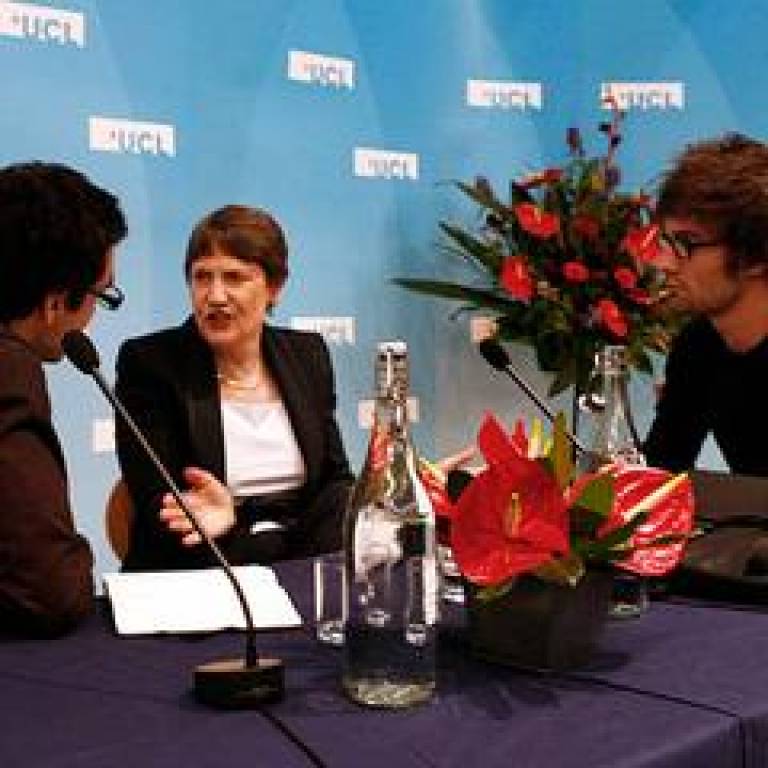Q&A: Helen Clark, 2010 UCL Lancet Lecturer
29 November 2010
Isaac Ghinai and Martin Everson, presidents of UCL global health society
 uclmedsin.co.uk/" target="_self">MedSIN, let us into their conversation with Helen Clark,
United Nations
Development Programme
Administrator, based on her Lancet Lecture that took place
at UCL on 22 November.
uclmedsin.co.uk/" target="_self">MedSIN, let us into their conversation with Helen Clark,
United Nations
Development Programme
Administrator, based on her Lancet Lecture that took place
at UCL on 22 November.
The full lecture can be viewed below.
You said in your lecture that the Millennium Development Goals (MDGs) are the "most comprehensive set of agreed benchmarks for development progress", and yet you stress the importance of national ownership in creating effective policies. Do you therefore think the MDGs are a helpful framework?
"I think they are helpful, because they are goals and not policies. There are many ways of getting these goals, and international organisations must give national governments the freedom to design their own strategies.
That's not to say we can't offer our advice and expertise; multinational organisations like UNDP have the benefit of overview; I see our role as a "global knowledge network". We've seen what works in different settings and we've seen what doesn't. It's this kind of insight that we can share with developing countries.
And remember these are open to modification. As they are, they give inspiration to many states to drive forward certain sectors, but we've seen successful examples of countries like Burkina Faso which have modified the goals for their unique setting and achieved good progress. Whilst there has been a lot of discussion around what should be included in the goals, I believe if you tried to write them again today, you'd come up with a similar list of priorities; perhaps something specifically on inequity, but broadly similar."
What role does South-South cooperation (aid between two developing countries) have to play in the success of the MDGs? Can the "virtuous cycles" across the sectors of one state be extended across states and regions?
"The thing to recognise about South-South cooperation is that it's different with every player. Whereas the OECD [Organisation for Economic Co-operation and Development] has a template for aid, China gives its development in a totally different way to India, in a totally different way to Cuba. This has the potential to be fantastic, but UNDP, as a representative of all member states, has a responsibility to show that this cooperation has benefits for all.
There's no point in building infrastructure if it can't be staffed and maintained in the future. Our role is to provide the axillary support to this cooperation to maximise its efficacy. The software can't work without the hardware! Because of this difference in the way it works, it is also difficult to scale up immediately to regions or continents. There's no blueprint you can roll out for South-South cooperation and expect it to work everywhere; it needs to be built up in conversation with regional partners."
What do you envisage academic institutions contributing to any framework designed to promote international development?
"The main role I see for academic institutions, both now and in the future, is the provision of sound evidence and research. This body of research can then be used in the formulation of policy underpinned by a strong rationale.
There is, however, a lot of sound evidence on good policy that exists already but is not being enacted. As I mentioned, equity, participation in government and long-term, sustainable approaches have all fostered development even when economic growth is slow.
The evidence is there, but formulating policy from that is no easy task; a new academic discipline on how best to translate evidence into policy is growing, and this could be a key role in the creation of a new set of development targets."
Image: Isaac Ghinai (left) and Martin
Everson in discussion with Helen Clark, courtesy of Teddy Hla, UCLU PhotoSoc
Click on the player below to watch the 2010 Lancet Lecture in full.
UCL context
The UCL Lancet Lecture is now in its ninth year. It is hosted by the UCL Institute for Global Health, which is developing an institution-wide agenda leading to strategies, programmes, research and teaching to bring the university's combined expertise to bear on the Grand Challenge of Global Health.
 Close
Close

